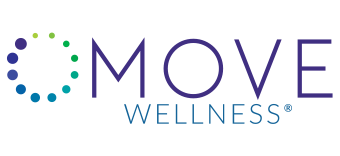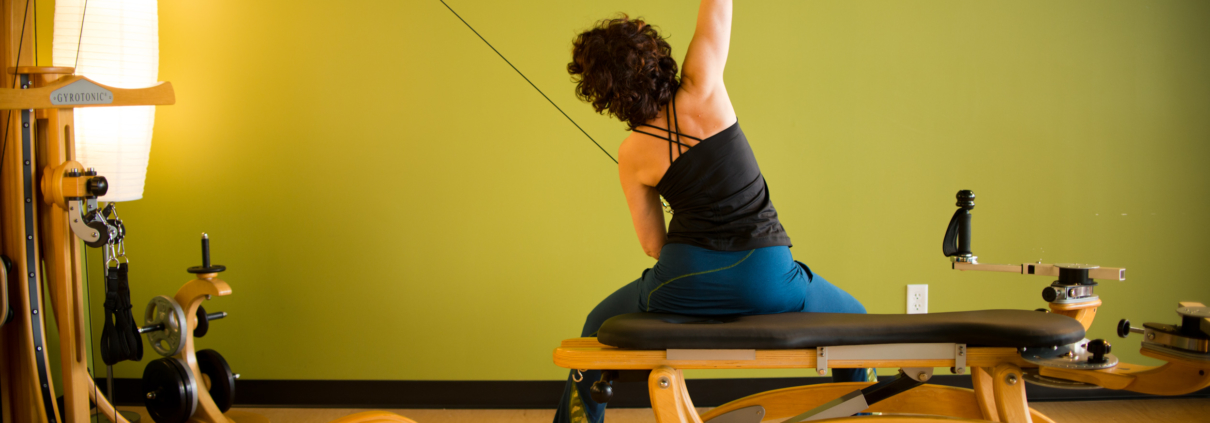Being part of a continuum of care network in and around our Ann Arbor community is an essential part of the wellness experience we provide at MOVE. And we are so grateful for partners like the healthcare professionals at IHA who are committed to providing people with opportunities to have open discussions about their health.
A special women’s health series event on menopause
On Tuesday, May 14, MOVE and IHA are co-sponsoring a free event at MOVE Wellness in Ann Arbor focused on managing menopause. To help frame our conversation for that evening, two of the event’s speakers offer their initial thoughts on menopause and sexual health, and their connection to overall wellness. Event details can be found below as well.

Common myths and misconceptions about menopause
Having open conversations about powerful phases of our lives is important to us at MOVE. There are so many women’s issues that simply don’t get afforded the time and honest treatment they deserve. Being able to have in-depth discussions about issues like menopause is empowering. It helps women care for themselves and live healthier, happier lives.

Elaine Economou 
G. Bridget Long, MD
A conversation with Elaine and Bridget
ELAINE
Menopause is a remarkably profound phase of life for women. For many, it coincides with children leaving home and the fundamental effect that has on our identity. It’s also characterized by reflection and can lead to more substantive considerations of our quality of life.
Dr. Long, what are four or five of the biggest misconceptions or myths about menopause that you see or hear regularly?
BRIDGET
First and foremost, that life will never be the same and that menopause is something to dread. And that’s underscored by additional misconceptions such as “my sex life is over” and “it’s too late to get healthy or lose weight.” Many women also believe that prescription hormone replacements are dangerous, which isn’t the case, and meanwhile ignore abnormal uterine bleeding during menopause when they should be having it evaluated.
All of these myths can cause harm to women because they can lead to a range of health issues including depression, fatigue, osteoporosis, cardiac disease and even cancer in some cases.
ELAINE
How individual of an experience is menopause for each woman?
BRIDGET
Although many symptoms are commonly shared, menopause is a completely unique experience for each woman.
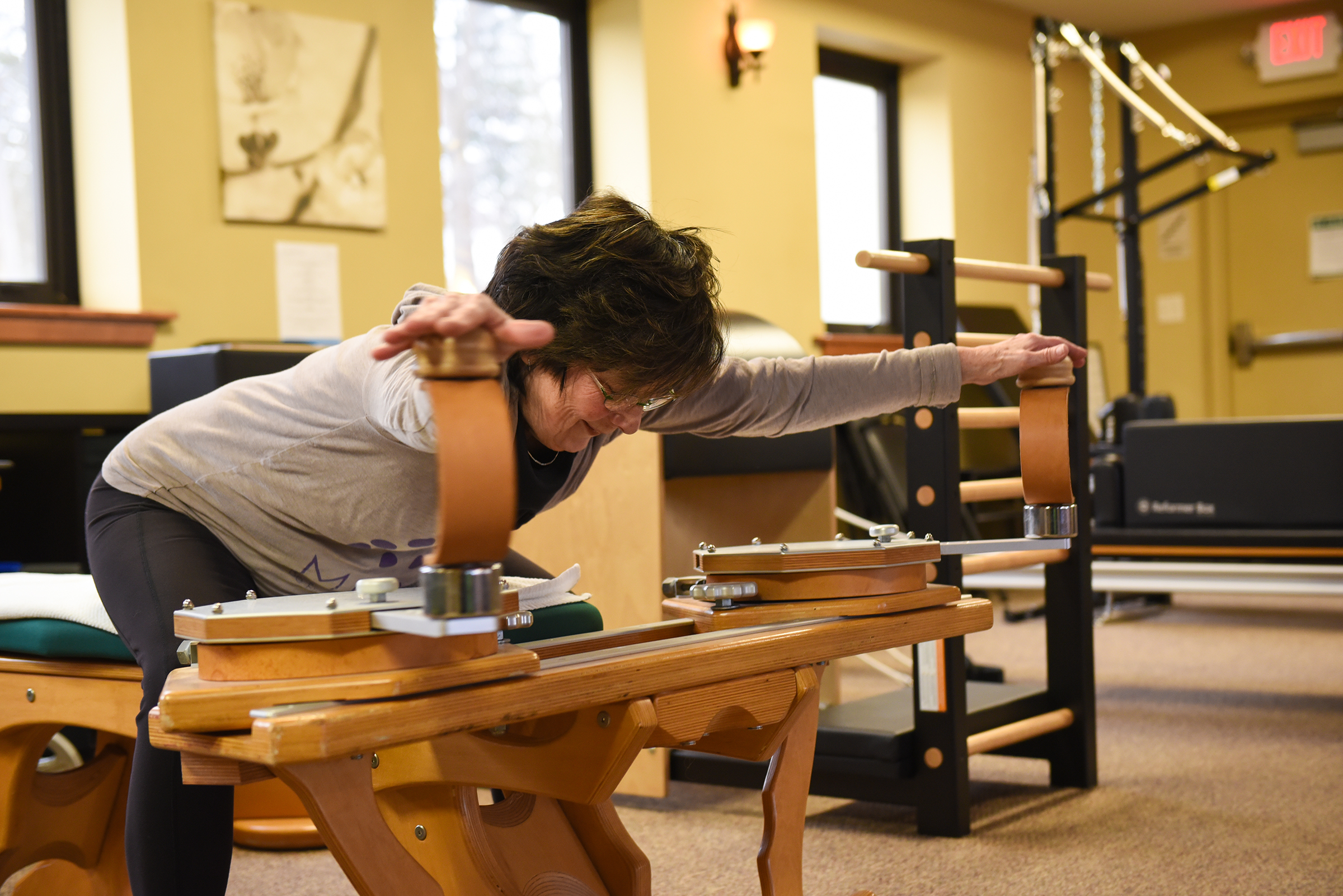
Increasing strength and health during and after menopause
ELAINE
In my 20 years as a trainer, I’ve seen countless women at age 50 or older get as strong as they’ve ever been in their lives through Pilates and GYROTONIC®. Every one of them wished they had started ten years earlier because of the powerful impact on their fitness and strength. So, I’ve seen firsthand the misconception that you can’t be fit and healthy after this phase of your life proven wrong.
We have female and male clients we train with who are in their 50s, 60s, and 70s and even some at 80 or 90 who have been working with us for 10 years, many of whom feel as fit as they’ve ever been in their lives. And it’s such a gift for our team to be a part of that experience.
Do you have a specific example of a patient you’ve worked with who successfully moved past one of those misconceptions about menopause and how she did it?
BRIDGET
I specifically remember a delightful patient in her late 50s who was moderately overweight and had a family history of osteoporosis. Her bone density showed significant osteopenia, which is bone loss. After extensive counseling regarding her life risk of cardiovascular disease and bone fracture, both of which had the potential to limit her independence, she chose to join a gym and work with a trainer who designed a program customized for her needs. She presented to my office a year later and told me she felt like her life had been saved. She realized that what she ate and what she did had major impacts during menopause.
She was happy she’d lost weight, but mostly she was happy about being strong. She was really enjoying life as she headed into her 60s, maybe more than ever before.
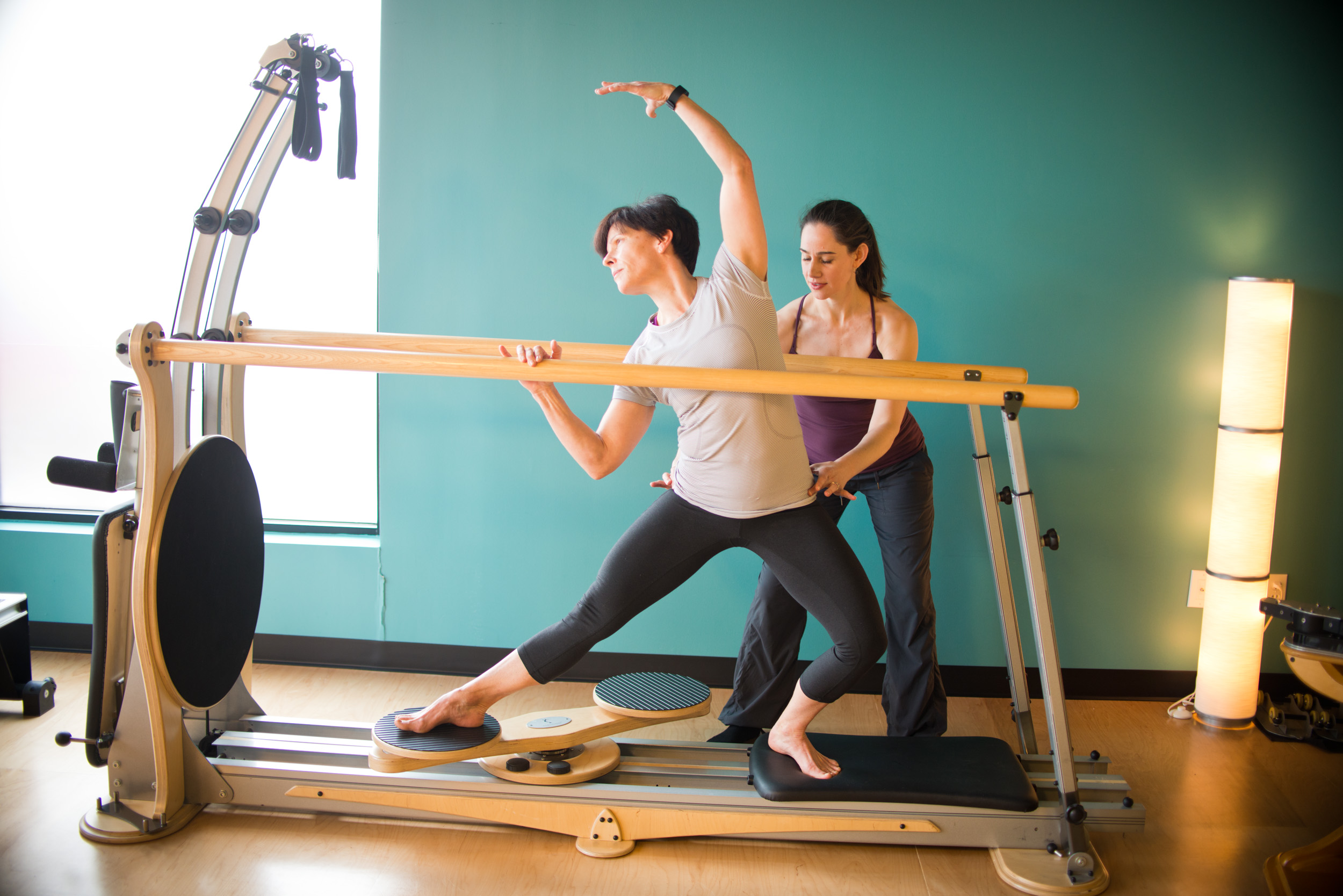
Overcoming the stigma and fear of menopause
ELAINE
“Menopause” can be such a loaded word. Do you find that the word itself is a stumbling block for women? Do you ever find yourself working to help women redefine the word? Or do you find yourself steering them toward a different word or phrase entirely like “sexual health”?
BRIDGET
From what I’ve seen, the word sparks dread in women. I try to explain to them that menopause is simply a life phase – much like puberty. It can be miserable, or it can be empowering if you embrace it and take control of it.
Menopause is a time in life, perhaps more than any other, when you “reap what you sow.” If you prioritize a healthy lifestyle, the benefits are significant. If you don’t, the problems can be exponential.
Managing menopause with family members
ELAINE
As a woman married to a man living in a house with my three sons, I’ve worked hard to help them understand the various cycles and phases in a woman’s life so that they might be in touch with any of their own life transitions. And it isn’t easy. Because the cultural pressure to qualify what being a woman is or isn’t or should or shouldn’t be is complicated. But I keep it simple and try to share the biochemistry of the process to help normalize conversations and topics.
Can you talk a little bit about the role of family for women experiencing menopause, particularly when it comes to any men in our lives?
BRIDGET
Relationships, particularly with a partner during menopause, require a lot of communication. It’s challenging, and I find that women often just give up. I feel that having the opportunity for open communication with their physician and realizing there are options to ease this transition can be life-changing. Intimacy is important and can make for a happier life, but I always tell my patients that they can define that intimacy with their partner. And it’s not the same for everyone.
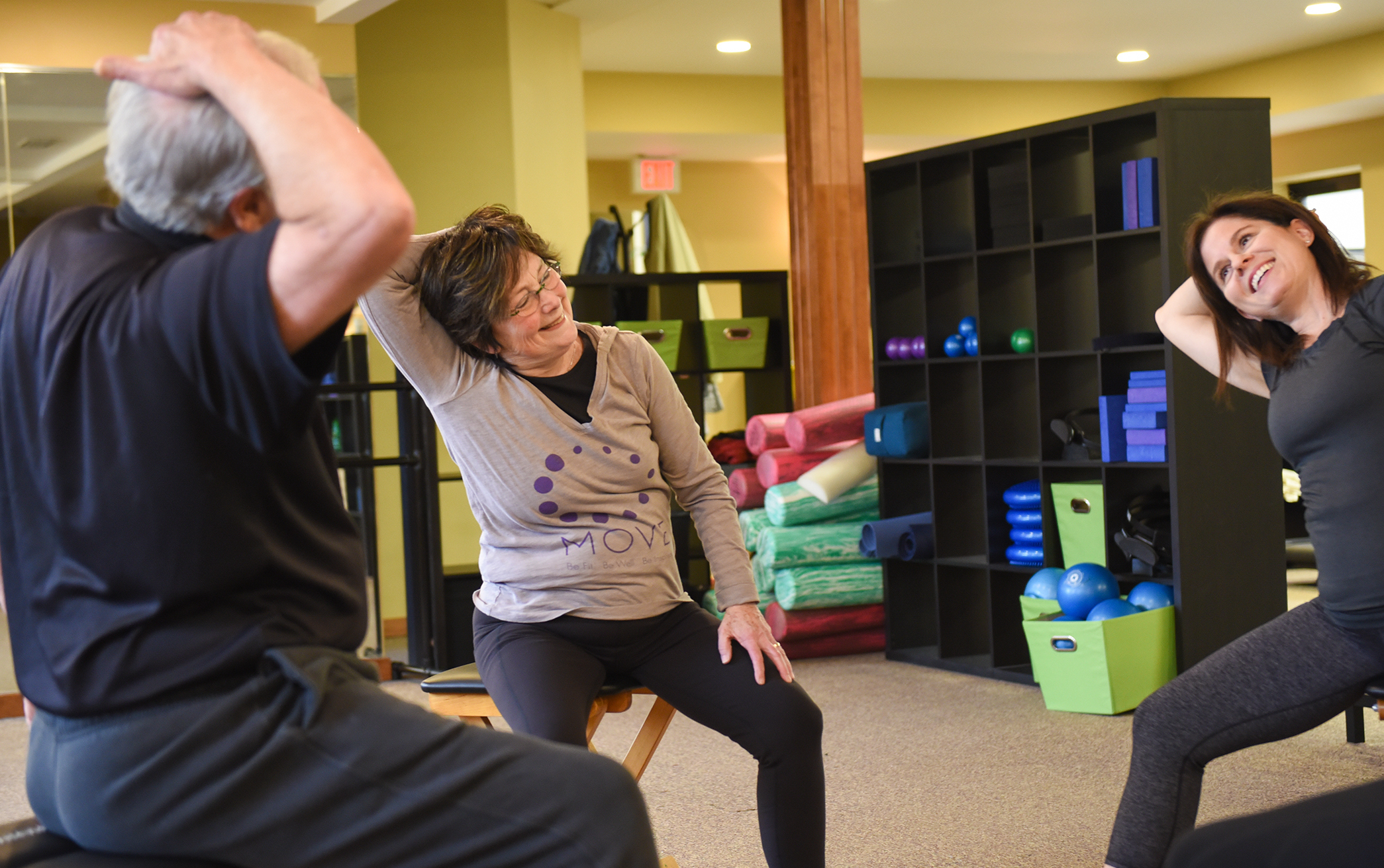
The role of community in aging and menopause
ELAINE
How important do you think having access to a supportive community is for women experiencing menopause?
BRIDGET
It’s incredibly important. There is power in numbers, and opportunities to learn from one another. It makes us realize that we’re normal.
ELAINE
I completely agree. Connecting with other supportive and accepting women helps in so many ways. And I believe that building a supportive community around fitness can help with accountability and troubleshooting. We love watching women support each other in classes as they move deeper into the Pilates repertoire. We regularly hear them say that they’re doing things they never thought they could do.
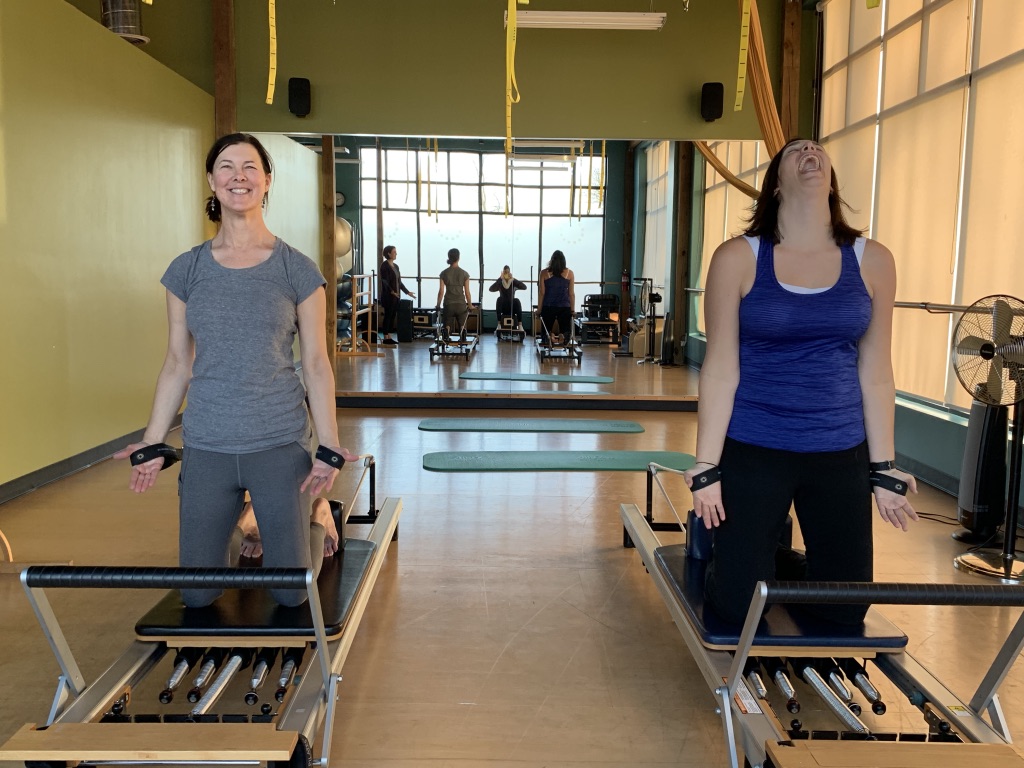
The relationship between sexual health and physical activity
Can you talk a bit about the relationship between women’s sexual health as they age and physical activity? What are the benefits of movement for women experiencing various symptoms and challenges related to menopause?
BRIDGET
There’s a direct relationship between physical activity and sexual health. The endorphins make us feel good, and exercise makes us feel good about ourselves. Women are complex, especially when it comes to sex drive. We need to feel “sexy” and good about ourselves.
ELAINE
Agreed. Our mission is to help people move their bodies in ways that they enjoy so that they can lead a life they love. Research shows that we commit to those healthy behaviors that we enjoy and that make us feel good.
This has impacted me personally. Feeling strong and moving my body in ways I enjoy, rather than how I feel I “should” has impacted how I feel about myself overall. It feels a bit like shedding a skin, leaving behind the pressure to conform. It’s wonderful to experience what we’re always working to help other women feel at MOVE. What a gift.
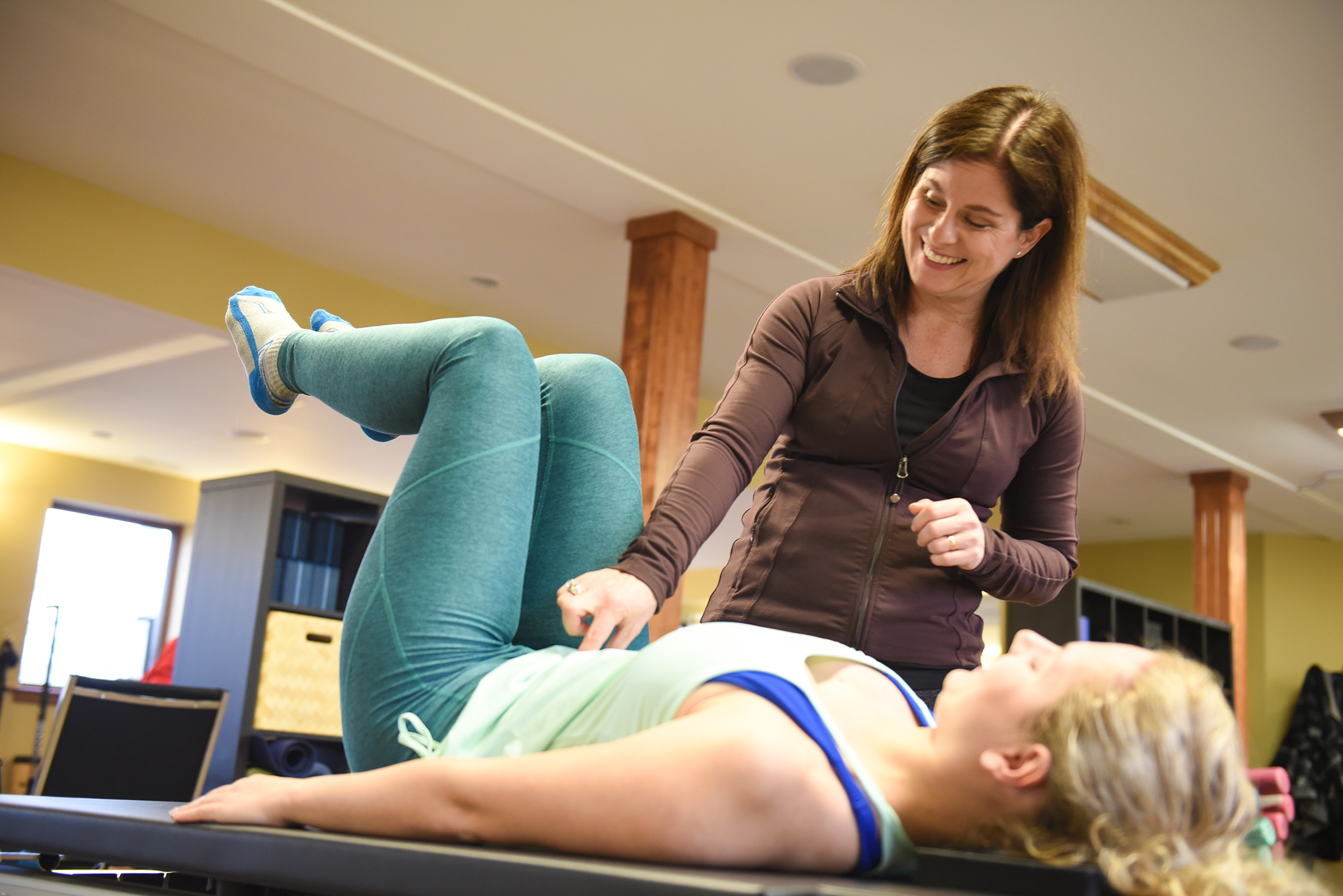
What movement instructors and trainers can do to help during menopause
ELAINE
Do you have any advice for movement instructors working with women experiencing the symptoms of menopause? What can movement professionals do to better support clients in this space?
BRIDGET
I think as our bodies transition through menopause, movement that focuses on core muscle retention and flexibility is most important for maintaining our health and feeling good. Keeping our pelvic floors strong and working to maintain abdomen and back muscles are super important.
ELAINE
Right, and from the training perspective, there are clear dos and don’ts which is why working with instructors and trainers with a deep knowledge of the body and these issues is so important. For example, many people are afraid to exercise after menopause if they’ve received an osteoporosis diagnosis. But with proper, safe training, you can actually mitigate further bone loss.
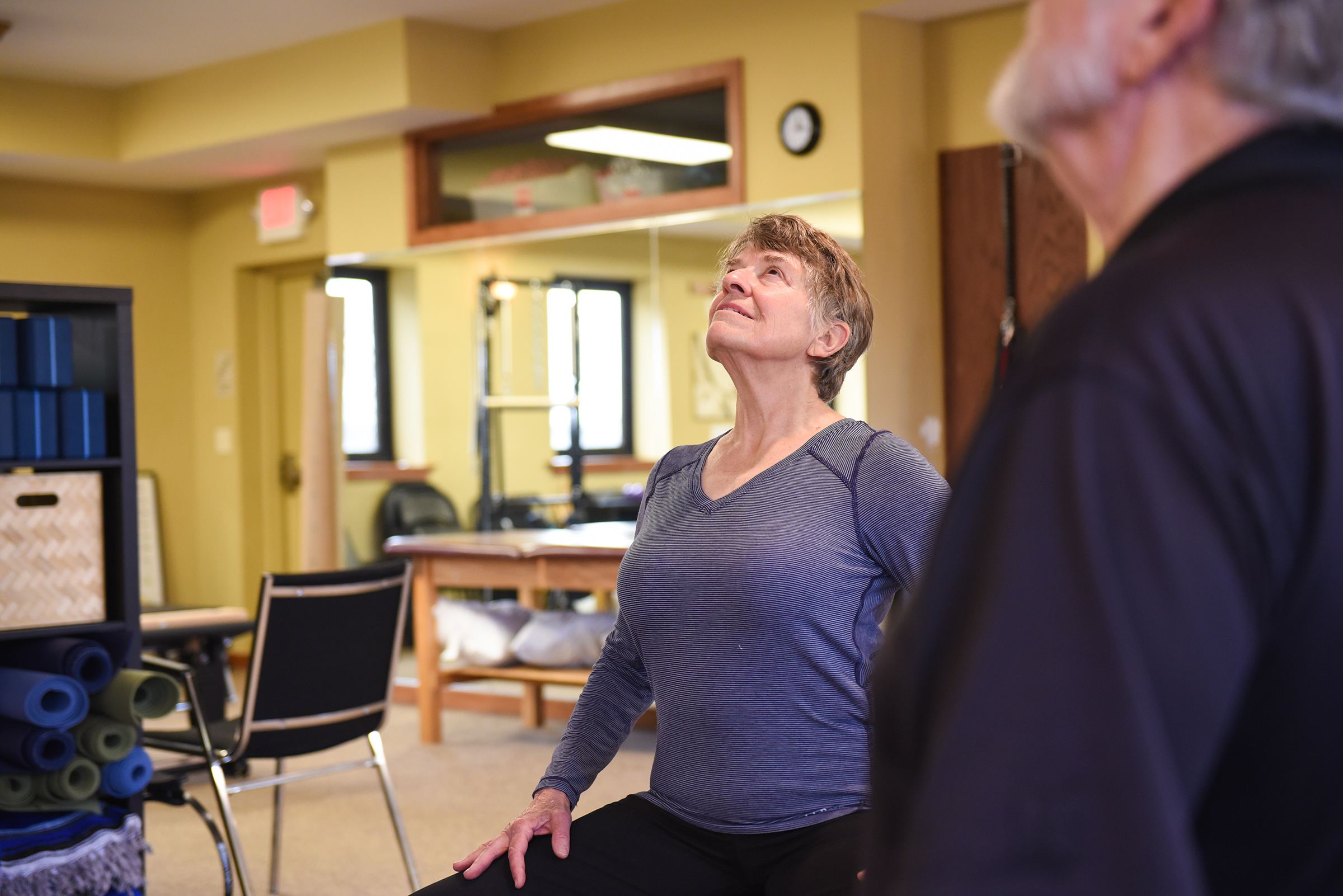
Demystifying pelvic floor health and the role of Pilates and GYROTONIC® method
ELAINE
What’s one thing you wish everyone knew about pelvic floor health?
BRIDGET
It requires maintenance like any other set of muscles in your body. You must exercise it to maintain its strength.
ELAINE
I couldn’t agree more. Pelvic floor health is important, and often misunderstood in everyday practice. Especially because each woman’s body and how she carries it is unique. Many women do a ton of kegel exercises, which could help in particular instances, but could also cause more of a problem in others. As Pilates and GYROTONIC® instructors, we work to help women at all stages of life understand how to care for their pelvic floors in a more organic way. Improper training can lead to low back pain, SI joint instability and other issues.
What are some of the other resources available to women experiencing sexual health challenges that you’d like to see more people take advantage of?
BRIDGET
IHA has started a new genitourinary syndrome of menopause (GSM) program that I feel is incredibly innovative in its approach to managing sexual health during menopause. Our consultants will discuss symptoms, causes and management of sexual problems in menopause with patients.
ELAINE
That’s actually great to hear. Quite often we hear women (who may not have even mentioned incontinence when they started working with us) say after a few weeks or months of training that they no longer “sneeze and pee.” Which is a funny diagnostic, but also a very pragmatic one. Pilates and GYROTONIC® help with this because they focus on organizing breathing and spinal movement to support core training.
Why is tackling this particular topic important to you personally?
BRIDGET
I am now a menopausal woman. Life is short, and I want to enjoy every day of it!
ELAINE
Yes! As a woman experiencing perimenopause, I feel like the last year has brought a wave of new physical experiences and symptoms, many of them surprises, and all of which have made it necessary for me to stop and reevaluate the “why” behind my own fitness and movement.
If you could provide women with one simple takeaway about menopause and their sexual health, what would it be?
BRIDGET
That there is help! Managing the symptoms requires work, but the rewards are well worth it.

The healing power of movement
By working toward a healthy relationship with their bodies, women can move through menopause with the strength and knowledge they need to care for themselves and celebrate the power and beauty in their bodies during this unique phase of life.
It’s also important to remember that slow and steady wins the race for healthy behaviors and a joyful life. Moving slowly and intentionally as we take steps to move more, eat well and love our bodies for all that they’ve done for us is foundational … at any stage of life.
We hope you’ll join us for this very special evening of honest conversation, empowerment and perhaps even enlightenment.
Managing Menopause: Improving Your Sexual Health
Tuesday, May 14, 2019
6 p.m. – Wine & hors d’oeuvres, 6:30 – 9 p.m. – Presentation
Location: MOVE Wellness Studios, 3780 Jackson Rd., Ann Arbor, Michigan
Speakers:
Elaine Economou, MOVE Wellness co-founder and CEO
Jody Jones, MD, IHA Canton Obstetrics & Gynecology
G. Bridget Long, MD, IHA Associates in Gynecology & Obstetrics – West Arbor
Lisa Morris, MD, IHA Associates in Gynecology & Obstetrics – Arbor Park & Brighton
Topics: Vaginal pain with intercourse, vaginal atrophy, MonaLisa Touch® treatments, pelvic floor dysfunction, mindfulness and breathing exercises
Interested in learning more about how MOVE can help you start your own health and wellness journey through movement? Sign up for an introductory package today or contact us at 734-761-2306 or office@movewellness.com.
